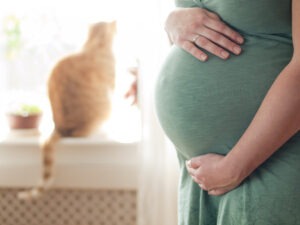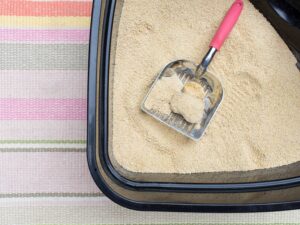The USA pet ownership statistics carried out in 2018 indicated 25.4% of the population in the country owned cats. It is true to say that this number has increased over the years.
Did you know that having a cat affects how you behave? Your cat’s poop and litter box could be the reason why. According to past research, the cat’s feces can cause a series of effects on your cat owners. At the end of this article, you will know:
- The effects of cats’ urine on your health.
- How to prevent risks from cats’ poop.
- Effects of litter on pregnant women.
- The effects of litter on your cat.

Table of Contents
Is Cat Urine Dangerous for Humans?
Generally, health experts say that you are not at too much of a risk.
Cat urine produces ammonia fumes. It is a toxic gas that causes severe breathing issues. The ammonia fumes irritate the bronchial membranes, severe coughing, and damages the tissues in your trachea and lungs. It is indeed a dangerous gas when you get in contact with it.
If you do not clean your litter box regularly, the buildup of urine and feces will result in ammonia gas generation. Yes, it is true high levels of ammonia are dangerous. It is also true that if you clean your litter box occasionally, you will not be at risk of ammonia exposure.
In simple words, if you are a cat owner who waits long enough to clean their litter boxes, then you should be very worried about exposure to ammonia. Do not worry if you clean your cat’s litter box regularly.
How to Prevent Risk from Cat Feces?

Bacteria Toxoplasmosis Gandhi is common in cats. This bacterium poses a high health hazard to you. There is no shortcut in preventing risk from cat feces.
Wear gloves
Treat cat feces the same way you treat other toxic wastes. You need to wear gloves any time you step into the bathroom to clean the litter box. Also, when in your garden use gloves when gardening or touching the soil as it may be contaminated with poop.
Wash hands
Wash your hands with soap and water after cleaning the litter or coming from the garden.
Tell your children
You should also emphasize the importance of cleanliness to your children. Practicing high hygiene levels will play a great role in ensuring you are never at risk of contamination of T.gandii from cats’ poop.
Effects of Cat Litter on Pregnancy

Pregnant women must not clean or change litter boxes.
Cat feces affect them the most compared to other people. Why? The parasite, Toxoplasmosis Gandini affects the fetus when a woman is exposed to it during cleaning or changing the litter box. At first, there are no symptoms. You will not know whether you are affected. Symptoms will not show on your child too during delivery but will start to manifest after a few months. Your newborn infant is at risk of seizures, hearing problems, blur vision, and lung problems.
Toxoplasmosis comes from eating undercooked meat, rodents, and birds. You should strive to feed your cat dry and canned pet food. However, the bacterium does not become infectious in the feces until five days after its excretion. Regular cleaning and frequent changing of the litter box will ensure you never come into contact with Toxoplasmosis.
Please note: Pregnant women SHOULD NOT clean cat litter boxes.
Effects of Dirty Cat Litter on Cats

Dirty litter boxes are a perfect growth site for bacteria that causes urinary and kidney problems. Inefficiency in cleaning these boxes poses a high health risk to your cat. Cats have a high level of cleanliness. Just like you, your cat will not enter a dirty bathroom to do its business. This is where all the problems start to manifest.
According to health practitioners, holding in waste for long is harmful to the cat’s health. This might result in kidney infections, urinary infections, and bladder infections. Your cat will be very uncomfortable. It will try to avoid the litter box, thereby, holding in wastes. Though these conditions are not fatal, the cost of treatment is significantly high.
Things about Cleaning The Dirty Litter Box
Cleaning dirty litter box not only keeps your cat happy and healthy, but you too will be one happy person. There will be minimum health risks to both of you.
1. How to clean the litter box?
Follow these simple steps to clean the litter box:
Step1: Use a litter scoop to clean out the clumps at least once a day.
Step2: Add some litter to replace that lost during cleaning. This serves to keep the smell at a minimum, which is beneficial to your cat.
Do these two simple steps every day. You should also clean the entire litter box regularly to ensure it remains free from microorganisms.
Step3: Dump the litter box and soak it in hot water for 15 minutes.
Step4: Add a cleaning detergent.
Step5: Use a scrub to clean the box.
When cleaning the litter box avoid cleaning detergents that have bleach, ammonia, or any type of caustic substance.
2. How often should you clean your litter box?
You should strive to scoop the litter box at least once every day. The cleaner the litter in the box is, the more likely the cat will want to use it. Furthermore, wash the litter box entirely once a week to keep it clean and tidy. This minimizes the risks of contamination.
3. Recommended cleaning products when cleaning
If you are going to clean the litter box thoroughly then you will require some supplies such as:
- Disposable gloves.
- Disposable face mask.
- Cleaning rag, sponge (specifically used for cleaning a litter box), and a scrub brush.
After you have washed it, use a dry paper towel or cleaning towel to dry it. Sprinkle soda it with baking soda. You should never use scented while cleaning. What might smell good to you might repel the cat and cause it not to use the litter box. Additionally, some scented products may be toxic to the cat.
The Importance of a Clean Litter Box

A clean litter box makes happy and healthy cat and cat owners.
It is your responsibility as a cat owner to keep the litter box clean. Just like you, your cat will not use a dirty litter box. She will look for an alternative and this might be in laundry or rug. Whom will you blame?
When you start with a clean litter box, ensure that it remains in that state throughout. A clean litter box makes a happy and healthy cat as well as a happy cat owner.
Conclusion
A cat needs a clean environment to do its business. It values cleanliness more than a human being can. Therefore, you have to ensure that you scoop poop daily and replace the litter in the box. Most importantly, regularly wash the litter box at least once a week.
